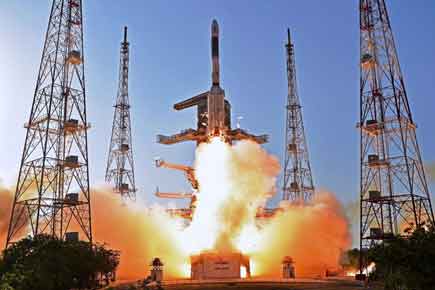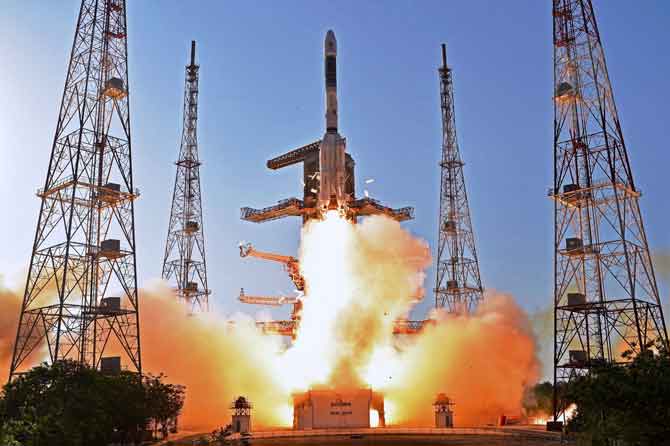Precisely at 4.57 p.m., the GSLV-F09 rose into the sky from the second launch pad at the Satish Dhawan Space Centre at the Sriharikota spaceport in Andhra Pradesh


Indian Space Research Organisation (ISRO)'s communication satellite GSAT-9 on-board GSLV-F09 lifts off from Satish Dhawan Space Center in Sriharikota on Friday. Prime Minister Narendra Modi has termed the satellite as India's “space gift for South Asia”. Pic/PTI
India successfully launched, in copy book style, the South Asia Satellite, intended to serve "economic and developmental priorities" of South Asian nations, using its heavy rocket Geosynchronous Satellite Launch Vehicle (GSLV-F09).
ADVERTISEMENT
Precisely at 4.57 p.m., the GSLV-F09 rose into the sky from the second launch pad at the Satish Dhawan Space Centre at the Sriharikota spaceport in Andhra Pradesh, carrying the satellite, intended as an Indian Gift for its fellow Saarc nations except for Pakistan which had opted out.
The 49-metre, 415 tonne rocket slung the 2,230 kg satellite into geosynchronous transfer orbit, from where it would be taken up to its final geostationary orbit.
In 2014, Prime Minister Narendra Modi tasked the Indian Space Research Organisation (ISRO) to develop a satellite for use by the Saarc countries.
Costing around Rs 235 crore, the satellite was initially known as the Saarc satellite. But with Pakistan deciding to keep out, it is called the South Asia Satellite. With a life span of over 12 years, its objective is to provide communication applications in Ku-band for the user nations.
The satellite, with its 12-Ku band transponders-transmitters and receivers of radio signals, will enable telecommunication, tele-education and tele-medicine as well as mapping of natural resources.
It would also provide/augment internet connectivity and would be useful in disaster management.
Modi has said the South Asia Satellite would go a long way in addressing the region's economic and developmental priorities.
"Natural resources mapping, telemedicine, the field of education, deeper IT connectivity or fostering people-to-people contact, this satellite will prove to be a boon in the progress of the entire region," he said.
"It is an important step by India to enhance cooperation with the entire South Asia... It is an invaluable gift. This is an appropriate example of our commitment towards South Asia. I welcome all the South Asian countries who have joined us on this momentous endeavour," he had said.
According to an official, the ISRO decided to have electric power for the satellite.
"We have not reduced the volume of the traditional on-board fuel because of the electric power. We have added electric power facility to check its performance for use in future satellites," the official told IANS.
He said the next satellite with electric power will be the GSAT-20 slated for launch in 2018.
The GSLV is a three stage/engine rocket. The core of the first stage is fired with solid fuel while the four strap-on motors by liquid fuel. The second is the liquid fuel and the third is the cryogenic engine.
One of the spin off benefits for India through this launch is that in the international satellite launch market, GSLV-Mk II rocket may gain the confidence of potential customers.
India puts into orbit foreign satellites for a fee, using its lighter rocket, the Polar Satellite Launch Vehicle (PSLV). However the weight of third party satellites is not much.
Revenue for launching satellites depends on weight of the satellite - the higher the weight, higher will be the revenue.
The month end is expected to see the launch of GSLV-Mk-III with communication satellite GSAT 19 weighing around 3.2 tonne - the heaviest satellite to be lifted by an Indian rocket from Sriharikota.
 Subscribe today by clicking the link and stay updated with the latest news!" Click here!
Subscribe today by clicking the link and stay updated with the latest news!" Click here!







